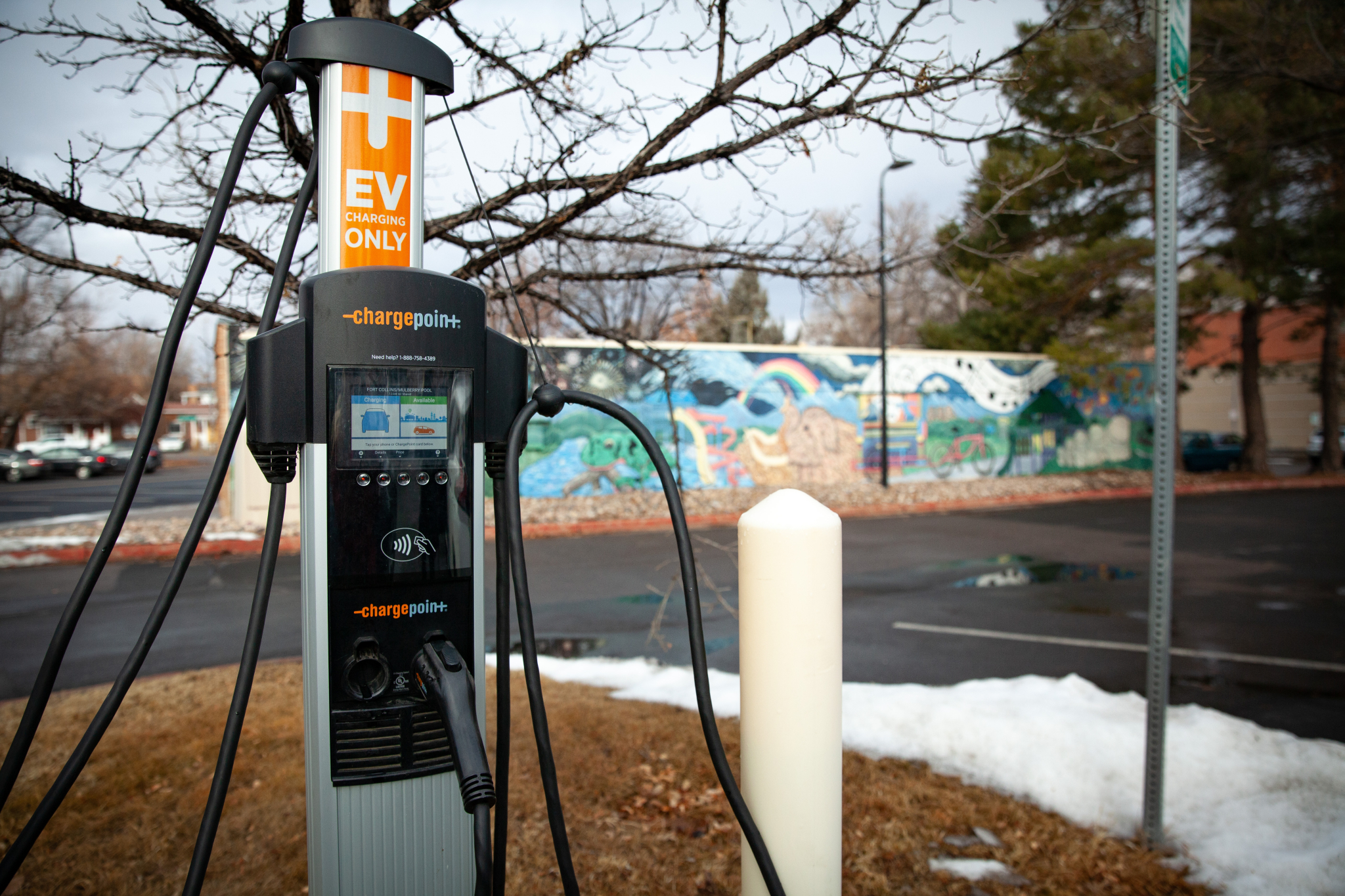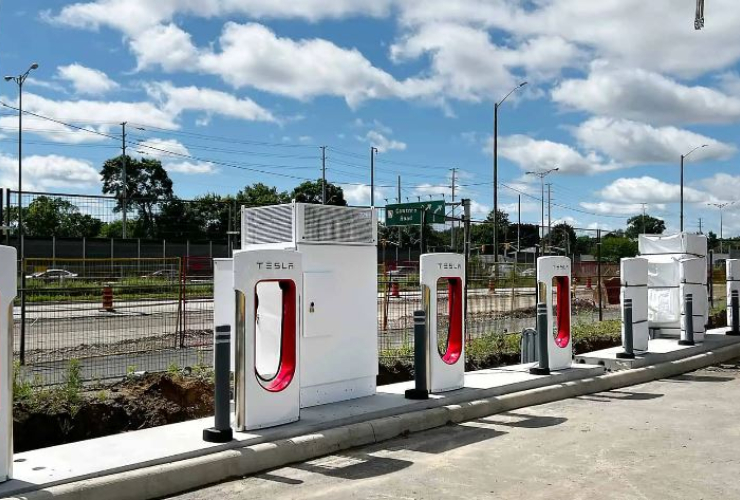Over the next few weeks, I’m going focus on electric vehicles (EVs) and examine some of the most popular fallacies being embraced by those who don’t believe we can build a cleaner future. This is a key battleground for fossil fuel interests and people who dismiss the seriousness of the climate emergency.
There is an ongoing media campaign in Canada to try to convince people that electric vehicles are a terrible idea. To demonstrate this point, I simply searched for “National Post electric vehicle” on Google.
The top result was “Guilbeault wants to ban gas-powered vehicles by 2035.” The next 10 results were articles claiming EVs are less reliable, don’t work in the cold, will increase foreign imports, are an assault on the middle class, and nobody wants them anyway. Pro-EV opinions were few and far between on several pages of search engine results.
You can try the same experiment with many of the 130-plus Postmedia brands across Canada and find very few writers extolling the virtues of electric vehicles. Even the formerly left-leaning Globe and Mail has nothing nice to say. You may find some positive EV editorials in the Toronto Star, Edmonton Journal and CBC News online, but based on sheer volume, it would appear there is a unified media consensus opposing electric vehicles.
This onslaught of negativity has left me experiencing a troubling form of cognitive dissonance. Anti-EV sentiment is not aligned with the exuberant testimonials I receive from the EV drivers I know. I’ve watched young children gather in excitement around my friend’s Tesla in the same way I used to fawn over a Corvette Stingray.
A recent report by the Canadian Automobile Association seems to further muddy the waters. A survey of over 16,000 EV owners across Canada uncovered strong concerns about charging infrastructure, taking long trips and cold weather performance. It also noted that most EV owners still own a gas-powered vehicle for longer trips.
However, the respondents also indicated that their worries about range, cold weather and battery degradation dropped significantly after owning an EV. More importantly, the satisfaction level was extremely high.
“An overwhelming majority (97 per cent) say they will purchase another EV when it comes time to replace their existing one. Almost nine in 10 (89 per cent) say they enjoy driving their EV more, 95 per cent say their EV is more affordable, and 92 per cent say their EV is a quieter ride than their gas vehicle.”
Undoubtedly, there have been problems as automakers introduce new designs, establish new supply chains and build assembly lines to support the EV transition. But the concerns raised by numerous opinion pieces aren’t presented as problems we need to solve. These stories are alarmist and amplified with a frequency that feels more like a sustained effort to sway public opinion. The end result is slowing the evolution to a better system and a cleaner future.
In Canada, passenger cars and light trucks account for roughly 40 per cent of the transportation sector’s greenhouse gas (GHG) emissions. At 28 per cent of Canada’s total GHG emissions, transportation is second only to the oil and gas industry’s emissions. There’s no way we will reach our commitment to net-zero emissions by 2050 without transitioning the transportation sector to zero-emissions vehicles.
The federal government is trying to make that happen with a $5,000 incentive on the purchase of light-duty EVs and a maximum $200,000 incentive for businesses and organizations looking to invest in medium- and heavy-duty EVs. The Canada Infrastructure Bank has financed over 5,000 zero-emission transit and school buses across the country and the federal Electric Vehicle Availability Standard sets sales targets for Canadian auto manufacturers and importers.
The EV incentive has been helping increase its market share to 13.3 per cent in the third quarter of 2023, but affordability is still a concern for lower-income Canadians when a new EV in Canada costs over $40,000. That said, as manufacturers roll out low-cost models and the availability of used EVs increases, there will be affordable options that come with lower fuel and maintenance costs than a gas-powered vehicle.
Norway is an example of a country that successfully introduced economic incentives that have been embraced by Norwegian drivers. Another sales record was set in 2023, with EVs comprising 82.4 per cent of new passenger car sales. Nearly 700,000 EVs are supported with 3,000 public chargers and more than 7,500 fast chargers across the country.
Sadly, when it comes to enthusiasm for a rapid EV transition, people are divided into two camps. There are those who embrace the emerging future and wish it would happen faster and there are those who like the way things are and become outraged when governments try to create policies to speed up the transition.
Norway has shown how effective economic incentives can be, but in Canada, the naysayers are dominating the media narrative on electric vehicles.
Rob Miller is a retired systems engineer, formerly with General Dynamics Canada, who now volunteers with the Calgary Climate Hub and writes on behalf of Eco-Elders for Climate Action, but any opinions expressed in his work are his own.
I've noticed the same. Lorne
I've noticed the same. Lorne Gunter's over the top critique a couple of weeks ago led the pack. He quoted 2 Consumer Reports that were much more nuanced than his rant. And referenced one guy whose truck didn't work in northern Ontario while CBC carried a story about a Yukon truck owner whose experience was the opposite. It's time for people who have EVs and like them to mount a counter offensive with Op Eds etc. It's important to get the facts that show EVs make sense much more in the public eye.
As you note, there are issues that need improvement and better information but to argue EVs won't work is simply false. As Norway demonstrates in spades.
Thanks for this column, Rob! I hope you are also sending in Op Eds to National Post media
I definitely have noticed the
I definitely have noticed the same naysayers in comments and social media. Especially anytime an EV fire occurs, that is pushed as a major negative. Oddly enough, fossil fuel vehicles catch fire every day due to a defect or shoddy maintenance by the owner. In reality, the first model year of any new or remodeled vehicle typically has many issues that the dealership resolves and recalls from my experience. Why would an EV being really new tech, be any different.
One difference here with EVs is that the battery tech is fairly new and still evolving. Especially in areas where the battery array needs to be serviceable to cell module level, rather than one massive array that has to be replaced if a module or cell becomes defective. This has an impact on insurance rates given the battery arrays are a very expensive item. This is something governments need to push for a change and understand that the EU has begun to mandate this.
Good article.
Good article.
It's clear that advertising dollars affect the content of media. In some quarters there are pages of "light" truck and SUV ads that alternately portray them as icons of environmental virtue with a family cruising slowly through deserted wilderness with deer looking up curiously as they pass, or as machines of destruction tearing up hillsides, dirt flung in all directions.
These ad companies know their stuff and tailor make their products for a selection of stereotypical personalities. It's time for EV makers to step up and do a lot more of their own ads and counter the flak head on, including the editorial content of the carrier.
We're always late to the
We're always late to the party; social media long ago pounced on and capitalized the gap, leaving us high and dry.
So it's way past time for OUR war room to kick into gear on ALL fronts; think of the conservatives as Putin and us as Ukraine, difficult though it is to contemplate the evil maggot actually winning, but it IS a bit of a toss-up.
For that to happen we have to name the enemy first, something still somehow hanging in the air; think of it as our version of denialism.
In this muddied, muddled context, much more drama is required, but clean, sharp, even breathtaking drama. Recall how all the media goes there first, always. In that respect they're more astute and more honest than we are.
EV subsidies are poor climate
EV subsidies are poor climate policy. And even worse environmental policy.
EV subsidies are an extremely expensive way to reduce emissions. Investment in public transit and cycling gives us far more bang for our climate buck
EV subsidies reinforce social inequity. Handing out EV subsidies to wealthy people who don't need them while ignoring the transportation needs of people who cannot afford cars or choose not to drive is unjust.
Cars, car culture, and sprawl are the real problem, not the drive train.
Car culture is hopelessly unsustainable. Cars and car culture are an environmental and social catastrophe even without a tailpipe.
The energy extravagance of billions of people using private vehicles in sprawled cities is obscene. Billions of people commuting hundreds and thousands of kilometres per week is an environmental nightmare.
Using two or three tons of metal to transport a 150-lb human being is an ecological non-starter.
A one-Earth footprint cannot accommodate an energy-intensive lifestyle where people drive everywhere they go -- or an urban model relying on millions of cars to transport millions of people.
The solution is not billions
The solution is not billions of EVs and billions of dollars in EV subsidies.
The only green solution is public transit, billions of bicycles, millions of miles of sidewalks and bike paths, and cities designed for people, not cars — with amenities close to where people live.
EVs are the yuppie response to climate change. Not for nothing that most of the first EV models were luxury cars beyond the reach of most citizens. Wealthy progressives want EV subsidies so they can salve their guilty conscience over their outsize footprint without having to make any real change in their unsustainable lifestyles.
Once consumers with political power — middle- and upper class voters — are happily ensconced in their automobiles, there is no shifting them. There is no incentive for governments to invest in and improve transit if the vast majority vote for cars and EV subsidies.
The decisions we make now about urban design set the blueprint for generations to come. Cars drive sprawl, and sprawl forces people to drive. Sprawl makes efficient public transit impossible. There is no road from more private cars and more sprawl to better public transit.
Doubling down on cars (EVs) makes already difficult problems intractable and puts solutions out of reach. Forever.
We have a choice: the public good — or private benefits for the few, while perpetuating the same ills that car culture has inflicted on society for decades.
"A developed country is not a place where the poor have cars. It's where the rich use public transportation" – Gustavo Petro, Mayor of Bogotá
Again, agreed, but not where
Again, agreed, but not where we ARE unfortunately; recall the vilification of "15 minute cities."
"Cars, car culture, and
"Cars, car culture, and sprawl are the real problem..."
Totally agree.
But the REAL problem is that our cities were built around the almighty car for 70 years straight and now we have perhaps 1,000 square km of sprawling low density single use suburbia across the entire nation. It will take generations to rebuild the cities even with a concerted long term effort and unlimited budgets.
We can work with that lag time with a plan to increase high capacity transit in agreement with cities to zone for multi-uses and alter our urban design and architecture around human beings instead of cars. Within the ~40 years of densification that will entail, the EV can have an immediate role to lower demand for liquid petroleum. Couple that with a move toward mass electrification, fossil fuels in our cities will disappear far more quickly.
Transit oriented development is key, as is liberating road space (which consumes 40+% of our urban land) for human beings and transit in all its forms. That takes time, even with a mass buildout of rapid transit. In the meantime, EVs, including taxis and car share vehicles, can have a positive effect on emissions and family budgets. Living in a denser low rise neighbourhood (hello traditional 19th Century inner city urbanism) is genuinely pleasant and convenient with almost everything you need within walking distance. But the exurbs are far, far from that reality and cannot justify the cost of decent bus service, let alone rail transit without a major revamp of town planning to convert auto-saturated sprawling suburban malls into actual self-contained villages and town centres catalyzed with high capacity rail transit. Enter EVs, although for shorter trips as the suburbs become satellite cities unto themselves.
"...10,000 or more km2 of
"...10,000 or more km2 of sprawling low density single use suburbia across the entire nation."
On point, Geoffrey.
On point, Geoffrey.
Excellent quote from S. Petro (curious surname, in the context) who is now president of Colombia. It's a view I've held since spending a few months in Stockholm decades ago and observed how people travelled to hear the symphony.
If Canadian cities were
If Canadian cities were designed like Stockholm we wouldn't have such a high car / oil dependency problem.
From a report by the non
From a report by the non-profit Rocky Mountain Institute, with data from the IEA and other energy analyists:
"The best strategy to rapidly phase out fossil fuels is to accelerate the deployment of technologies that reduce fossil fuel demand. Batteries are on the path to displace 86 exajoules (EJ) of fossil fuels from road transport (emitting 6 GtCO2 per year) and to put at risk another 23 EJ (or 1.6 GtCO2/y) from shipping and aviation. In the electricity sector, as batteries synchronize the natural rhythms of the sun and the wind with the timing of electricity demand, they help enable the reduction of a further 175 EJ of fossil fuel demand (or almost 15 GtCO2/y)."
https://rmi.org/wp-content/uploads/dlm_uploads/2023/12/xchange_batteries...
"Even the formerly left
"Even the formerly left-leaning Globe and Mail has nothing nice to say."
Excuse me?
I've been unimpressed in the past with this author's opinions, but portraying the G&M as left-leaning is from a parallel universe previously entirely unexplored.
To the point, years ago, yet several years after her final G&M contribution (to that date), Naomi Klein identified herself as the "token lefty" at The G&M. In my view, The G&M is "all neoliberal, all the time".
It's too bad, because we do need to engage in a 360 degree, adult conversation about the full lifecycle effects of our ways of living. Which, by the way, is not addressed simply by saying "EVs good, ICE bad".
"Which, by the way, is not
"Which, by the way, is not addressed simply by saying, EVs good, ICE bad."
Except that's basically true.
Also, it accurately reflects our current context where the political right wing has surprisingly but steadily become VERY bad, dangerously bad actually, while the left remains essentially good by virtue of accepting accelerated societal change in general with their typical equanimity. However, they have remained surprisingly blinkered to that political specificity, including its disastrous effects, AND how their characteristic open-minded tolerance has been fully taken advantage of.
If we've learned nothing else over the last few years of "social" media, it's that the majority of people are "simple" and malleable.
I also don't think it necessary to castigate the author on not knowing about the Globe and Mail's conservatism. It IS widely regarded as "Canada's national newspaper," which in fairness still means to most people that it's exemplary, fair-minded and objective, like journalism is supposed to be, AND like the country itself (and our politics) used to be.
So in our current bizarro world, THAT means the cons regularly disparage Canadian media as Liberal ("lamestream media" really stuck, soon followed by the even more effective "fake news") DESPITE the opposite being true-- that it's primarily owned by conservatives.
Take away ICE vehicles and
Take away ICE vehicles and the tar sands operations lose their No. 1 reason to exist. Is that not good?
Thanks Rob Miller, you are
Thanks Rob Miller, you are the reason I re-subscribed to National Observer today.
EVs are a luxury but so are
EVs are a luxury but so are SUVs. An SUV driver is unlikely to switch to biking or busing—are you kidding?—so focus on getting them to adopt EV or plug-in hybrid for legitimate cold/range concerns. If you can afford a SUV, you can afford a EV. Keep in mind that until the planet warms a few more degrees, cycling will remain a challenge for most of Canada for 6 months of the year.
Buses (electric, not those fricken LNG machines) is where investment should go, not just in cities but between cities and into rural areas. That is the equitable solution. And maybe families will even start hopping on buses for their trips to Grandmas.
Want rapid adoption? Go nuts and make them free.
After careful study I will be
After careful study I will be going Hybrid for my next car until they get the charging issues straightened out!
They need to set a standard for cost of charging since the big 3 or 4 charging stations are not all on the same page, it would take one government bill that would force all to do the same from coast to coast to coast, maybe not the same rate due to provincial taxation but the same way of billing. That alone in itself would help consumers and suppliers.






Comments